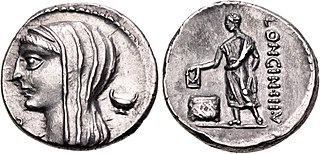Longinus may refer to:
Year 43 Chars BC was either a common year starting on Sunday, Monday or Tuesday or a leap year starting on Sunday or Monday of the Julian calendar and a common year starting on Monday of the Proleptic Julian calendar. At the time, it was known as the Year of the Consulship of Pansa and Hirtius. The denomination 43 BC for this year has been used since the early medieval period, when the Anno Domini calendar era became the prevalent method in Europe for naming years.

This article concerns the period 49 BC – 40 BC.
Severus is the name of various historical and fictional figures, including:

Year 42 BC was either a common year starting on Monday, Tuesday or Wednesday or a leap year starting on Tuesday of the Julian calendar and a common year starting on Tuesday of the Proleptic Julian calendar. At the time, it was known as the Year of the Consulship of Lepidus and Plancus. The denomination 42 BC for this year has been used since the early medieval period, when the Anno Domini calendar era became the prevalent method in Europe for naming years.

Longinus is the name given to the unnamed Roman soldier who pierced the side of Jesus with a lance and who in medieval and some modern Christian traditions is described as a convert to Christianity. His name first appeared in the apocryphal Gospel of Nicodemus. The lance is called in Christianity the "Holy Lance" (lancea) and the story is related in the Gospel of John during the Crucifixion. This act is said to have created the last of the Five Holy Wounds of Christ.
Varus may refer to:

The gens Cassia was a Roman family of great antiquity. The earliest members of this gens appearing in history may have been patrician, but all those appearing in later times were plebeians. The first of the Cassii to obtain the consulship was Spurius Cassius Vecellinus, in 502 BC. He proposed the first agrarian law, for which he was charged with aspiring to make himself king, and put to death by the patrician nobility. The Cassii were amongst the most prominent families of the later Republic, and they frequently held high office, lasting well into imperial times. Among their namesakes are the Via Cassia, the road to Arretium, and the village of Cassianum Hirpinum, originally an estate belonging to one of this family in the country of the Hirpini.

Publius Servilius Casca Longus was one of the assassins of Julius Caesar. He and several other senators conspired to kill him, a plan which they carried out on 15 March, 44 BC. Afterwards, Casca fought with the liberators during the Liberators' civil war. He is believed to have died by suicide after their defeat at the Battle of Philippi in 42 BC.
Cassius Longinus may refer to:
Junia Lepida was a Roman noblewoman who lived in the first century. She was the second daughter of Aemilia Lepida and Marcus Junius Silanus Torquatus, one of the Junii Silani. Her maternal grandparents were Julia the Younger, granddaughter of the emperor Augustus, and Lucius Aemilius Paullus, consul in AD 1.
Fronto may refer to:
Cassius may refer to:
Gaius, sometimes spelled Gajus, Cajus, Caius, was a common Latin praenomen; see Gaius (praenomen).
Gnaeus, also spelled Cnaeus, was a Roman praenomen derived from the Latin naevus, a birthmark. It was a common name borne by many individuals throughout Roman history, including:
Gaius Cassius Longinus was a Roman jurist and politician from the first century AD. A grandnephew of Servius Sulpicius Rufus, he was also a nephew or great-grandson of Gaius Cassius Longinus, one of Caesar's assassins. Longinus was suffect consul of the second half of the year 30 as the colleague of Lucius Naevius Surdinus.
Liberalis may refer to:
Aper may refer to:
Modestus was a Roman cognomen. It may refer to:
Marcellus is a masculine given name and a surname, which comes from the Roman god of war Mars.